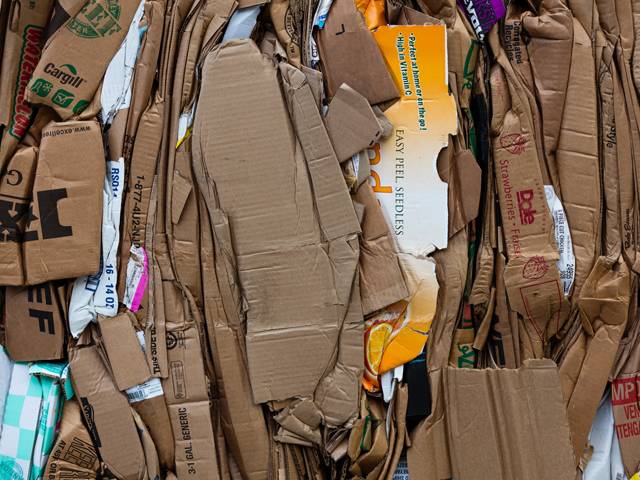Recycling Grants

A program to stop scientific equipment ending up in landfill, using old tyres to make pavement blocks and a plan to transform Dockland's food waste into compost are just some of the programs to receive City of Melbourne grant funding.
Councillors have approved $100,000 in grant funding to be distributed from the inaugural Waste Minimisation and Innovation Fund and $100,000 in grants for businesses and social enterprises with a waste minimisation proposal.
Lord Mayor Sally Capp said it was a top priority for the City of Melbourne to invest in ideas to help reduce waste going to landfill and support the circular economy.
"We received 120 grant applications related to waste reduction so there's a lot of passion and commitment to improve Melbourne's liveability and sustainability," the Lord Mayor said.
"This funding will help support projects that turn food waste from cafes into compost, use old tyres to make pavement blocks, reduce office waste and many more innovative ideas."
"We're considering important investments in up to 15 projects and initiatives and each one will make a difference locally, adding up to significant waste reduction across the City of Melbourne."
The following grants were approved by Councillors:
• Five grants of up to $5000 for community groups, residents groups, schools and non-profit organisations
• Three grants of up to $25,000 for startups, including social enterprise startups, and for universities including students and researchers
• Four grants of up to $30,000 for small business and social enterprises.
CERES Docklands will receive a $25,000 grant to install a food composting system at a new pilot social enterprise in Collins Street opposite the Library at the Dock.
Chair of the City of Melbourne's Environment Portfolio, Councillor Cathy Oke, said CERES plans to install an industrial in-vessel aerobic composter to recycle food waste from Docklands businesses and residents.
"The food waste will be transformed into compost that will be used by Docklands residents or sold at the CERES Nursery in Brunswick East. The project could divert 73 tonnes of food waste from landfill each year," Cr Oke said.
"Food waste costs the Australian economy $20 billion each year and creates greenhouse gases that contribute to climate change."
Councillor Oke said the smaller grants will support community groups that are trying to avoid creating waste.
"We're supporting high-rise residents in Southbank to compost their food and organic waste, reduce emissions, and create compost to use on their community garden," Cr Oke said.
"Scientific equipment is dumped in landfills every year so another grant recipient will expand their work giving this equipment to disadvantaged schools."
"Unison Housing also plans to run a waste education campaign for 960 households in public housing in Kensington."
Councillors have approved $100,000 in grant funding to be distributed from the inaugural Waste Minimisation and Innovation Fund and $100,000 in grants for businesses and social enterprises with a waste minimisation proposal.
Lord Mayor Sally Capp said it was a top priority for the City of Melbourne to invest in ideas to help reduce waste going to landfill and support the circular economy.
"We received 120 grant applications related to waste reduction so there's a lot of passion and commitment to improve Melbourne's liveability and sustainability," the Lord Mayor said.
"This funding will help support projects that turn food waste from cafes into compost, use old tyres to make pavement blocks, reduce office waste and many more innovative ideas."
"We're considering important investments in up to 15 projects and initiatives and each one will make a difference locally, adding up to significant waste reduction across the City of Melbourne."
The following grants were approved by Councillors:
• Five grants of up to $5000 for community groups, residents groups, schools and non-profit organisations
• Three grants of up to $25,000 for startups, including social enterprise startups, and for universities including students and researchers
• Four grants of up to $30,000 for small business and social enterprises.
CERES Docklands will receive a $25,000 grant to install a food composting system at a new pilot social enterprise in Collins Street opposite the Library at the Dock.
Chair of the City of Melbourne's Environment Portfolio, Councillor Cathy Oke, said CERES plans to install an industrial in-vessel aerobic composter to recycle food waste from Docklands businesses and residents.
"The food waste will be transformed into compost that will be used by Docklands residents or sold at the CERES Nursery in Brunswick East. The project could divert 73 tonnes of food waste from landfill each year," Cr Oke said.
"Food waste costs the Australian economy $20 billion each year and creates greenhouse gases that contribute to climate change."
Councillor Oke said the smaller grants will support community groups that are trying to avoid creating waste.
"We're supporting high-rise residents in Southbank to compost their food and organic waste, reduce emissions, and create compost to use on their community garden," Cr Oke said.
"Scientific equipment is dumped in landfills every year so another grant recipient will expand their work giving this equipment to disadvantaged schools."
"Unison Housing also plans to run a waste education campaign for 960 households in public housing in Kensington."
MORE





